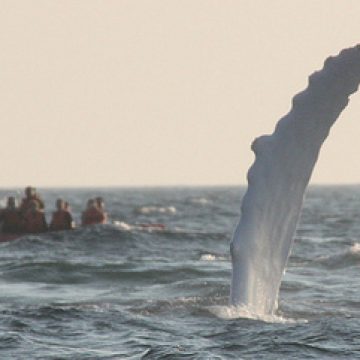“Shouldn’t the boat be bigger than the whale?”
I don’t often find myself agreeing with my precocious eight-year old daughter, but her logic seems irrefutable on this point. Standing at the pier for Captain Mark’s Whale & Seal Cruise on the north coast of Cape Breton Island, the two grey and orange zodiacs bobbing lazily in the sea strike me as woefully inadequate for close encounters with massive cetaceans.
Earlier in the week we boarded the morning ferry in Wood Island, PEI for the 75-minute trip to Caribou, Nova Scotia. We then tacked northeast, cutting through the town of Badek, Nova Scotia for a quick stop at the Alexander Graham Bell Historic Site. After zigzagging our way from the tiny town of Ingonish through the emerald hills of Cape Breton Highlands National Park, we arrive at the northern coastal outpost of Pleasant Bay.
The first 30 minutes of our marine safari is a disheartening criss-cross of seemingly empty ocean, populated only by the occasional sea lion and a lone bald eagle gliding overhead as we squint our eyes searching for whales. The captain, grim-faced and disappointed, blames the choppy seas. I muse aloud about the lone sailboat I spot off in the distance: “I can’t believe someone would try to sail so far from shore through this.” The captain snaps about with a pair of binoculars already glued to his eyeballs.
“That’s not a sail,” he says, trying, but failing, to suppress the thin smile that escapes his lips. We speed in the direction of my “sailboat” and watch a massive humpback burst out of the slate-grey froth, suspended in mid-air for what seems like seconds before crashing violently back into the water. Our tiny zodiac pitches and rolls through a series of miniature tsunamis as the whale surfaces again and again, slapping the water with its gargantuan pectoral fins until every passenger on our rubber skiff is happily soaked to the bone by the cold ocean spray kicked up by the whale.
We return to shore and decide to warm up with a brisk climb along the Skyline Trail — perhaps the most popular hike among dozens of wilderness paths that dot the winding peaks of the park. Each day we venture deeper into the park completing a circumnavigation of Warren Lake before stumbling upon our own private oasis at Mary Ann Falls. Despite the biting cold of the water, we strip down to our bathing suits and allow the waterfall to pound against our heads. When it’s finally time to move on, there’s a real sense of loss as trees and meadows give way to street lights and coffee shops.
Our return to civilization is delayed by a transitional visit to Glen Breton. Canada’s only single malt whisky producer offers charming accommodations in a series of chalets built high on a hill overlooking the distillery. Morning brings a dazzling sunrise and a few drams of fine spirits as I tour the facility, which bears more than a passing resemblance to its Scottish cousins. Switching over to our designated driver, my wife guides us to the Celtic Music Interpretive Centre in Judique, Nova Scotia. I grab a fiddle and scratch out a painful tune as my girls learn to tap out a traditional Celtic jig.
Crossing the causeway that separates Cape Breton Island from mainland Nova Scotia, I reflect on the Scottish-Canadian mash-up that marks the island. Stiff winds blow across violently raging seas sending plumes of salt spray into the verdant greenery; it’s highly evocative of my recent time on the Scottish links. Restaurant fare includes fresh local sea food, maple syrup desserts and Canadian whiskey as we take in a Celtic ceilidh. The cultural flavours are so deeply intertwined I’m left wondering whether Cape Breton is a little bit of Scotland right here in Canada or indeed a slice of Caledonia that somehow washed up on the Canadian coast. This ambiguity is the island’s greatest charm — mixing homegrown familiarity with a healthy dash of foreign adventure.
From the depths of a national park to the heart of the city, stay tuned for the next installment of East of Eden as The Crime Traveller and family hit a crush of museums in Halifax and drive across Nova Scotia to the bucolic fishing village of Digby.
Edward Prutschi is a Toronto-based criminal defence lawyer. Follow Ed’s criminal law commentary (@prutschi) and The Crime Traveller’s adventures (@crimetraveller) on Twitter, read his Crime Traveller blog, or email ed@thecrimetraveller.com.
Travel support and assistance provided by Tourism Nova Scotia.



